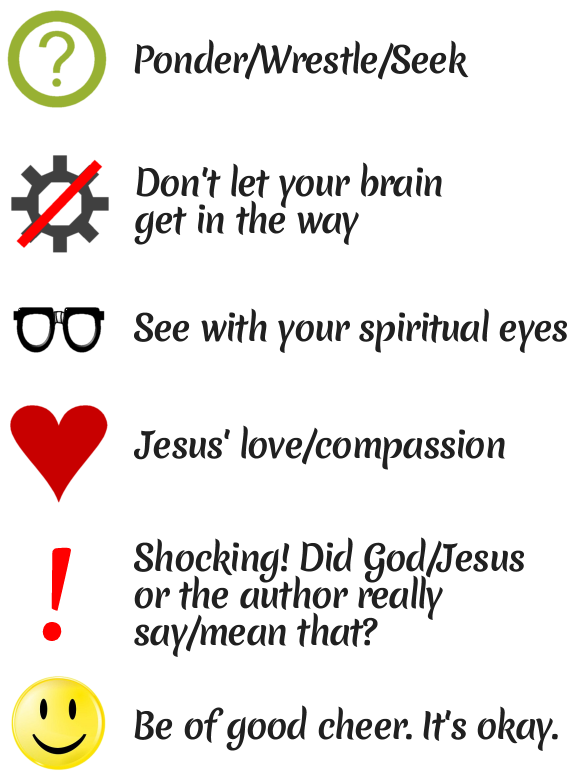Maybe we can help God by printing up some additional cash in these difficult times.
So do not worry, saying, ‘What shall we eat?’ or ‘What shall we drink?’ or ‘What shall we wear?’ For the pagans run after all these things, and your heavenly Father knows that you need them. But seek first his kingdom and his righteousness, and all these things will be given to you as well. Matthew 6:31-33
The question you must ask yourself is this: “Is this true?” If you believe the world’s ways of provision are more truthful than God’s ways, then by all means be true to yourself and live in such a way, and do it without guilt. If, on the other hand, you profess being a Christian, then live in such a way to display that you believe Him. There isn’t gray area in these passages in Matthew 6. Jesus is calling us to radical trust in our Father’s love and goodness — that He is The Provider. Jesus makes the division clear — that pagans (unbelievers) worry about and chase after provision, but believers in Him are to seek first his kingdom and his righteousness, and all these things will be given to you as well. Jesus goes on to say “Where your treasure is, so there is your heart”.
If you believe the world’s ways of provision are more truthful than God’s ways, then by all means be true to yourself and live in such a way, and do it without guilt. If, on the other hand, you profess being a Christian, then live in such a way to display that you believe Him. There isn’t gray area in these passages in Matthew 6. Jesus is calling us to radical trust in our Father’s love and goodness — that He is The Provider. Jesus makes the division clear — that pagans (unbelievers) worry about and chase after provision, but believers in Him are to seek first his kingdom and his righteousness, and all these things will be given to you as well. Jesus goes on to say “Where your treasure is, so there is your heart”.
Kingdom Economics
We’ve already been trained well, very well actually, in worldly economics. We have been trained so well we often dismiss what is most
true, which is Kingdom economics — how Jesus instructs us.
We are God’s treasure and God longs to be our treasure as well. Being Kingdom-focused is a demonstration of our love for God that comes from believing His love for us. It isn’t the sort of thinking that says “If I do this, then God will do that.” No, instead it’s a way of life that says “I will seek God with all my heart and pursue His righteousness and leave provision to Him, whatever that is.”

Jesus’ admonition to us in the Sermon on the Mount is a new life, a new way of seeing, and a new way of living. Is it easier, or simply more acceptable to believe in other characteristics of Christianity — like the resurrection of Jesus Christ from the grave, or salvation by faith, or forgiveness of sin? Does it not require as much faith to embrace these “truths” of Christianity as it does to believe God about provision? This may require us to thoughtfully consider what provision is. Jesus somehow forgot to define it and apparently is leaving up to the Father to determine what provision is for each of us. It seems we to need to remind God what provision looks like. Come to think of it, I remember something God said about daily bread….hmmm…where was that?
Does it not require as much faith to embrace these “truths” of Christianity as it does to believe God about provision? This may require us to thoughtfully consider what provision is. Jesus somehow forgot to define it and apparently is leaving up to the Father to determine what provision is for each of us. It seems we to need to remind God what provision looks like. Come to think of it, I remember something God said about daily bread….hmmm…where was that?
I wonder what it would look like if we took Matthew 6 to heart?
The problem with Christianity is that darn faith thing.


